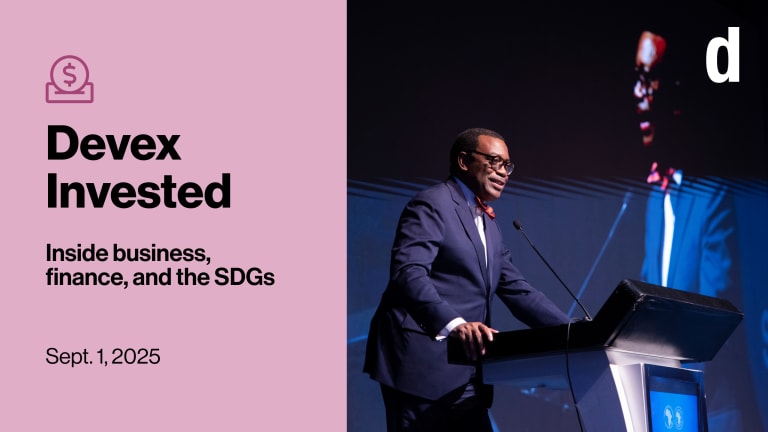
The World Bank has an ambitious plan to end extreme poverty by 2030.
Although a concrete strategy has yet to be drawn up, World Bank President Jim Kim has declared that tackling extreme poverty is also tackling energy access.
Allison Archambault, president of EarthSpark International, a social enterprise working to eradicate energy poverty in Haiti, discussed this issue at a civil society forum organized this week in Washington ahead of the World Bank’s spring meetings.
The World Bank needs to find a way to finance small social enterprises working on energy poverty, Archambault told Devex. Much of bank’s renewable energy investment goes to expensive grid extensions, and relying too much on these investments can leave one billion poor people without access to energy by 2030, according to the International Energy Agency, she said.
What concerns you feel the World Bank Group should discuss in the spring meetings?
I hope that energy access and social enterprise are addressed in meaningful ways. These two things are drivers of development and the World Bank Group can work to leverage these two topics for long-term developments.
If you have the chance to suggest to World Bank solutions to these issues, what could these be?
Very specifically, there is a practitioner network of social enterprises working on the topic of energy poverty who has called on the World Bank to support investments for social enterprises working on energy poverty, where commercial capital is not yet ready to invest because the business models are new and the world conditions are oftentimes unproven. However, there are excellent social enterprises who are making great progress to solving energy poverty who are facing financial constraints.
At present, is the World Bank’s funding for social enterprises enough?
The World Bank is making progress in investing more in renewable energy, which is important and should absolutely be congratulated, continued and extended. Nevertheless, this small-scale renewable energy is not supported enough to really leapfrog.
Has the International Development Association supported enough projects aimed at reducing energy poverty?
I would say it’s not enough for this particular section, this social enterprise for energy access. It’s not enough but it can be deployed in many ways that leverage both philanthropic dollars and commercial capital. The group has the ability to buy down risk and sort of kick start this sector in ways that’s just beginning now.
How are energy access and social enterprises connected to the World Bank’s 2030 vision of ending extreme poverty and boosting shared prosperity?
The U.N. declared 2012 the year of sustainable energy for all and it declared that because energy poverty, which is when people don’t access to clean or efficient energy resources, is really pervasive and cyclical and it contributes to the cycle of poverty because [the] poor pay a lot for low quality energy services.
If they can switch to more efficient, cleaner energy technology, it saves them money, improves their health and opens doors for a lot of economic growth. That’s just on the household level.
Is there a need to create new financial instruments to address energy poverty?
A new financial instrument, not necessarily. I think the World Bank has individuals who are thinking creatively about this topic. What needs to happen is that … a way for bank funding or for funding in general to go towards well-qualified social enterprises who don’t necessarily need a lot of money to make a big impact. And that is an important point. Much of the renewable energy investments from the World Bank to date have gone to larger projects, which is wonderful. However, the bank continues to fund dirty projects and it’s very challenging for smaller enterprises to access funding that could really have a lot of impact in directly addressing the topic of energy access and energy poverty.
Do you see a need for any institutional or structural or policy changes in the way the World Bank does business?
I do feel they need to figure [out] a way to get funding, buy down risk for private capital and piggyback on top of philanthropic capital in order to get World Bank money into the growth cycle for these social enterprises who are on the ground and need more funding in order to expand.
Join the Devex community and access more in-depth analysis, breaking news and business advice – and a host of other services – on international development, humanitarian aid and global health.








